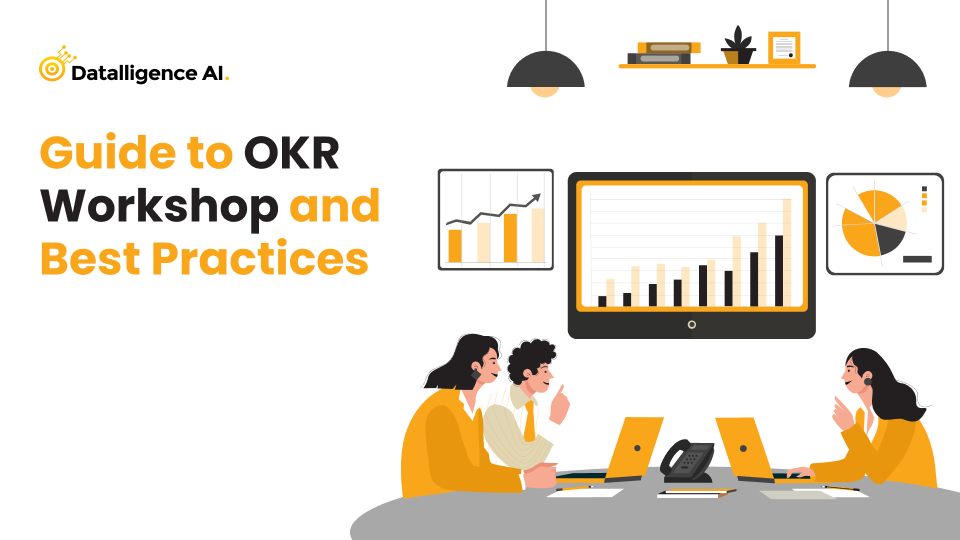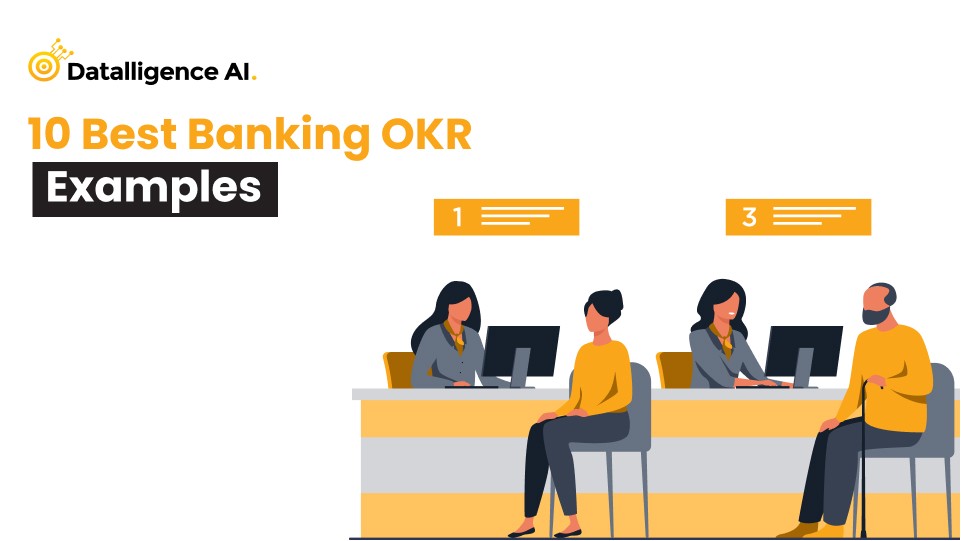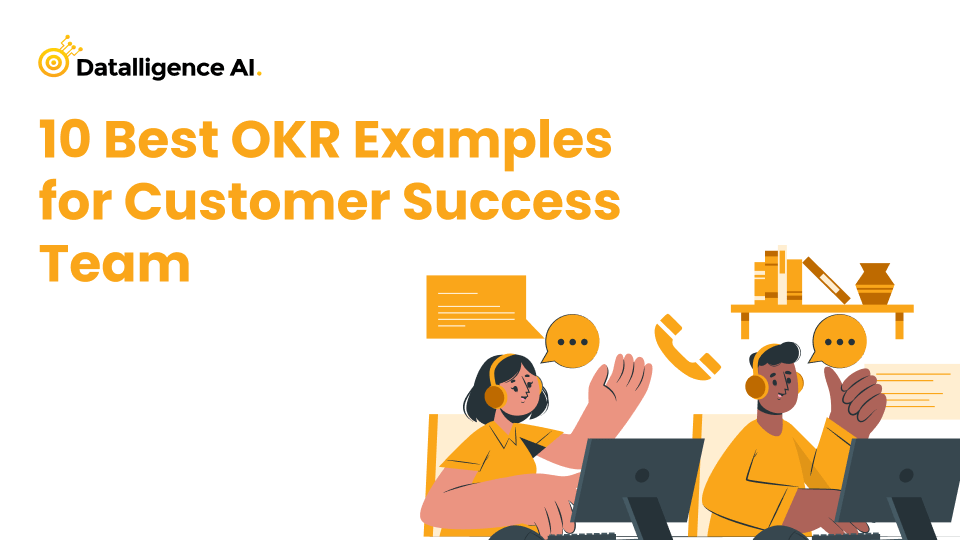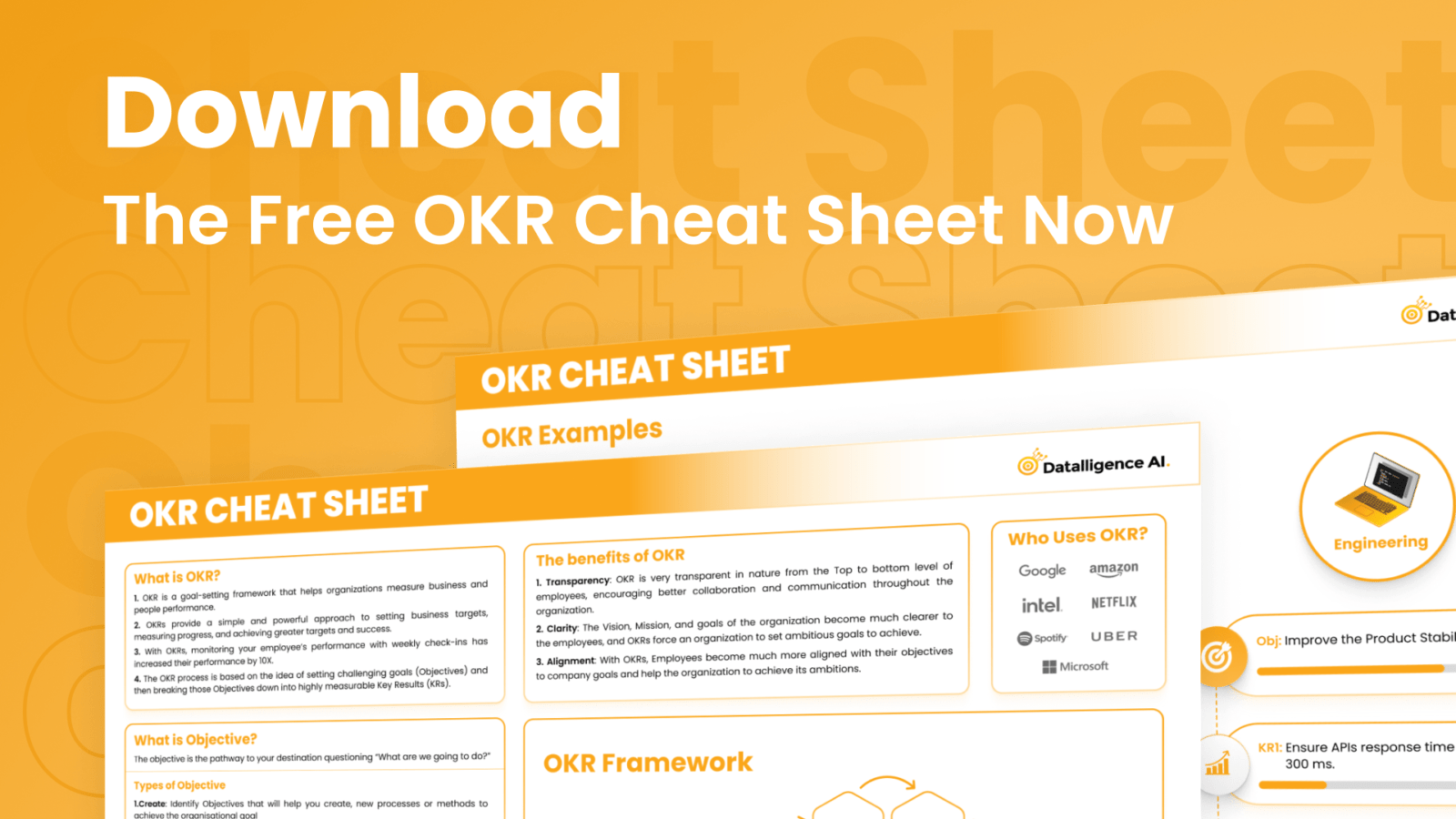A few years ago, scientists at the Dominican University of California found that people who made lists of their goals sent those lists to friends, and tracked their progress had a nearly twofold higher likelihood of accomplishing those goals than their less organized peers.
A similar system is effective, in our opinion! You can achieve comparable outcomes by implementing the well-liked Objectives and Key Results methodology (OKRs) in your company. But first, make sure that everybody is on board.
It’s likely that you, as an OKR champion or someone in a leadership role at the company, will want to lead an efficient OKR workshop, so let’s begin with one quarter.
We’ve got you covered if you’re stressed out about leading your first OKR review session because of the impending “end-of-quarter crunch”!
What is an OKR Workshop
OKRs are generally set on quarterly basics. And it’s the end of the quarter. Your internal stakeholders have a question that they keep asking as the current quarter draws to a close. You made your initial plans three months ago.
What are we going to do next?
An OKR workshop is a collaborative session conducted within an organization scheduled for reviewing old OKRs and drafting new ones. The purpose of the OKR workshop is to gather all the key stakeholders and set meaningful objectives and define measurable key results. OKRs workshops are also conducted to review old OKRs and review any roadblocks that may arise in the future. The workshop also allows for an open-ended discussion and feedback from all the employees and ensures that there is clarity and buy-in from all the participants.
It is a big job if that sounds like it. You’ll be an expert once you start holding these brainstorming sessions regularly, so don’t worry!
If you have doubts about conducting an OKR workshop, Read our latest blog on How to conduct an OKR Workshop
How to run an engaging OKR workshop
Don’t worry if you’re facilitating an OKR session for the first time. You can pull this off like a pro because we’ve divided the workshop planning phase into a number of parts.
Before the OKR Workshop
With any sound plan, you probably take some time to validate the strategy, specify the project’s parameters, and establish a few short-term benchmarks.
Similarly to this, your OKR workshop will have effects on the entire company, so you should have a strategy in place before the meeting. Here is a detailed step-by-step guide:
1. Clarify the company vision and goal
At the beginning of the year, the organization would have communicated the vision and goal for their annual year and where they’d like to allocate their resources this year.
So, before you start the workshop, It might be a good idea to talk to the employees that the annual goals still stand. That way, If there is any change in the vision or goal for the annual year, Objectives can be changed and it can save time and avoid confusion.
2. Talk to your Employees
Don’t forget to collect input from various team members from each department as you plan the agenda for your OKR workshop. The opinions of the team should be considered during this discussion. After all, they are carrying out the daily tasks necessary to achieve those strategic objectives.
Make sure you give teams a chance to independently review their OKRs from the previous quarter. posing the following inquiries:
- What issues did we concentrate on?
- What did we discover?
- What succeeded?
- What could be done better or how might we approach this differently?
- What unanswered questions are there left?
This allows teams to enter the session with details and data and provide context to others on what happened and what they worked on.
3. Compile Existing data and make them presentable
Now you have spoken to your team and gathered their honest opinions, it is time to pull out your company data from the current quarter and decided how out present it.
Tools like Datalligence – OKR software can help you present your data in a more holistic view during the meeting. Using Datalligence- OKR software can help present your data more visually and appealingly.

Try our OKR Software for free and see the difference.
4. Create a Meeting Agenda
OKR workshops can be extremely overwhelming without a clear direction. An agenda highlights all the topics that need to be discussed, Keeping distractions minimum. It is always better to set an agenda and send it to invitees to give them a chance to compose their thoughts and prepare.
During OKR Workshop
1. Create a favorable environment
The ideal setting is one in which you are confident that your team will feel at ease. Being comfortable is essential because, as was already mentioned, these OKR setting and planning workshops can last up to two hours, depending on the size of your organization.
Everyone is on time and on schedule. You could even plan 10 minutes in the beginning for settling in and chit-chatting. To get the group ready for a fruitful discussion, include some group icebreakers, and provide snacks or coffee.
2. Start with a Review
It is always better to start a meeting with a review of the previous quarter. Having a review of the previous quarter informs us of the challenges that were faced and how did we overcome that. Questions like:
- What problem did we face?
- How did we overcome that?
- How much time did it take to overcome that?
- How can we avoid that in the future?
Questions like this can be answered while reviewing our previous quarter’s OKRs and this can help us in our future roadblocks.
3. Present Drafts and Key Results
The fact that OKRs are connected to action plans and metrics is what makes the OKR framework so effective. Having a draft objective and key result when sharing this information with others in the company, they can get immediate feedback about initial ideas. Presenting this creates a new pathway new strategies, new metrics, and Cross-functional alignment among departments.
4. Create your OKRs
By the middle of your workshop or by the end, every team or department should have a working OKR they can set for their next quarter.
Why should you run an OKR workshop?
Alignment
OKRs aid in bringing teams and individuals together around common goals. Running a workshop gives participants the chance to comprehend the organizational goals, the reasoning behind them, and how their work helps the organization achieve those goals. By doing this, it is made sure that everyone is on the same page and moving in the same direction.
Clarity and Focus
The workshop promotes discussion and clarifies goals and significant outcomes. Together, participants can define and hone their objectives, making sure they are time-bound, relevant, specific, measurable, and achievable. It provides a sharp focus on what matters most and helps remove ambiguity.
Collaboration and communication
Collaboration and communication are encouraged across functional lines by OKRs. The workshop brings together various teams and departments to promote relationships and teamwork. It promotes open communication, knowledge exchange, and a team effort to solve problems.
Accountability and Transparency
The workshop fosters an open discussion of objectives and advancement. It promotes transparency and trust within the organization by encouraging participants to share their OKRs with others. Regular check-ins and progress updates encourage accountability because each person is in charge of monitoring and reporting on their major outcomes.
Motivation and Recognition
OKRs offer a structure for praising and honoring accomplishments. The workshop can include elements of rewards and recognition, praising teams and individuals who have excelled or made noteworthy progress. It increases drive, morale, and a sense of purpose.
Conclusion
As a result, conducting an OKR workshop can be a highly effective tool for organizations looking to bring teams together, increase focus, and achieve significant goals. Organizations can increase the efficacy of their implementation of OKRs by adhering to best practices and including the appropriate components in the workshop. Talk to our coaches and experts and gain their insights.











